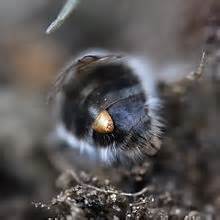What’s the Good of Good?
“Stylops parasitize divers other insects such as leaf hoppers,
ants, bees, and wasps. The female spend her entire life
inside the body of her host, with only the tip of her bean-
shaped body protruding. She is a formless lump, having
no wings, legs, eyes, or antennae; her vestigial mouth
and anus are tiny, degenerate and non-functional. She
absorbs food—her host—through the skin of her
abdomen, which is ‘inflated, white, and soft.’
“The sex life of a stylops is equally degenerate. The
female has a wide, primitive orifice called a ‘brood
canal’ near her vestigial mouthparts, out in the open
air. The male inserts his sperm into the brood canal
whence it flows into her disorganized body and
fertilizes the eggs that are floating freely there. The
hatched larvae find their way to the brood canal and
emerge into the ‘outside world.’
“The unfortunate insects on which the stylops feed,
although they live normal life spans, frequently
undergo inexplicable changes. Their colors brighten.
The gonads of males and females are ‘destroyed,’
and they not only lose their secondary sexual
characteristics, they actually acquire those of the
opposite sex.” ~ Annie Dillard, Pilgrim at Tinker Creek
“I was furious, even to the slaying, with the pessimist
who asked what was the good of good.” G. K.
Chesterton, Autobiography
The good in life sprawls, good and bad. The bugs
By trillions swamp us. Nectarizing bees,
And unsuspecting ants feel inner hugs
From female stylopses which take their ease

Inside their victims’ shells. The stylops eats
Her hosts and hostesses, absorbing blood
And other goodies through her skin. She treats
Herself to all she wants, so is the bud
Of lingering death inside them where she drawls
The way she alters them, destroying male
And female genitals (the drone’s wee balls
Consumed), her hungry belly turning pale.
So, here is how life should be understood:
There’s God—and evil devouring the good.